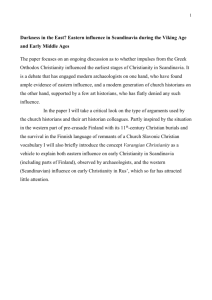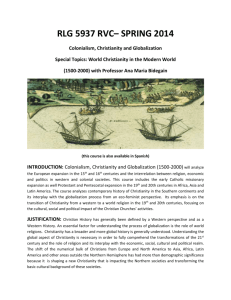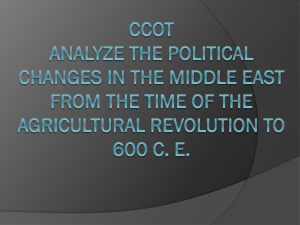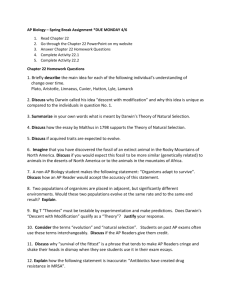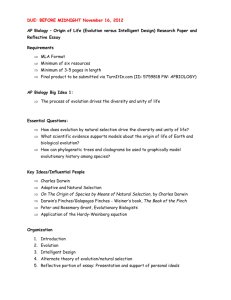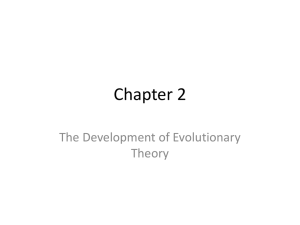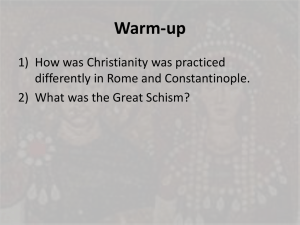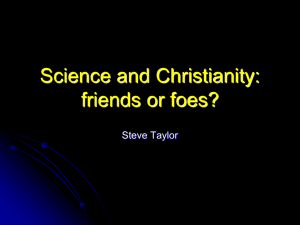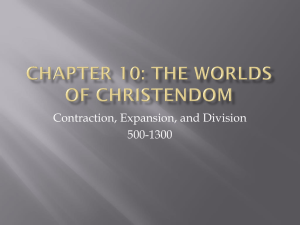Evolution and Creation - Are They Compatible?
advertisement
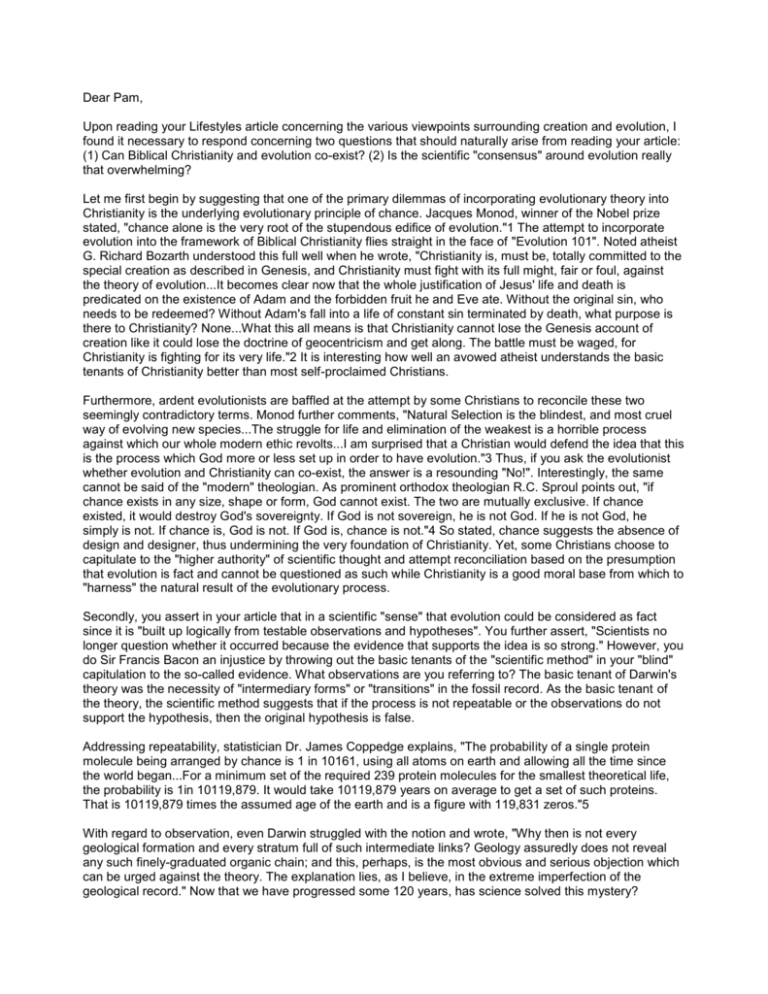
Dear Pam, Upon reading your Lifestyles article concerning the various viewpoints surrounding creation and evolution, I found it necessary to respond concerning two questions that should naturally arise from reading your article: (1) Can Biblical Christianity and evolution co-exist? (2) Is the scientific "consensus" around evolution really that overwhelming? Let me first begin by suggesting that one of the primary dilemmas of incorporating evolutionary theory into Christianity is the underlying evolutionary principle of chance. Jacques Monod, winner of the Nobel prize stated, "chance alone is the very root of the stupendous edifice of evolution."1 The attempt to incorporate evolution into the framework of Biblical Christianity flies straight in the face of "Evolution 101". Noted atheist G. Richard Bozarth understood this full well when he wrote, "Christianity is, must be, totally committed to the special creation as described in Genesis, and Christianity must fight with its full might, fair or foul, against the theory of evolution...It becomes clear now that the whole justification of Jesus' life and death is predicated on the existence of Adam and the forbidden fruit he and Eve ate. Without the original sin, who needs to be redeemed? Without Adam's fall into a life of constant sin terminated by death, what purpose is there to Christianity? None...What this all means is that Christianity cannot lose the Genesis account of creation like it could lose the doctrine of geocentricism and get along. The battle must be waged, for Christianity is fighting for its very life."2 It is interesting how well an avowed atheist understands the basic tenants of Christianity better than most self-proclaimed Christians. Furthermore, ardent evolutionists are baffled at the attempt by some Christians to reconcile these two seemingly contradictory terms. Monod further comments, "Natural Selection is the blindest, and most cruel way of evolving new species...The struggle for life and elimination of the weakest is a horrible process against which our whole modern ethic revolts...I am surprised that a Christian would defend the idea that this is the process which God more or less set up in order to have evolution."3 Thus, if you ask the evolutionist whether evolution and Christianity can co-exist, the answer is a resounding "No!". Interestingly, the same cannot be said of the "modern" theologian. As prominent orthodox theologian R.C. Sproul points out, "if chance exists in any size, shape or form, God cannot exist. The two are mutually exclusive. If chance existed, it would destroy God's sovereignty. If God is not sovereign, he is not God. If he is not God, he simply is not. If chance is, God is not. If God is, chance is not."4 So stated, chance suggests the absence of design and designer, thus undermining the very foundation of Christianity. Yet, some Christians choose to capitulate to the "higher authority" of scientific thought and attempt reconciliation based on the presumption that evolution is fact and cannot be questioned as such while Christianity is a good moral base from which to "harness" the natural result of the evolutionary process. Secondly, you assert in your article that in a scientific "sense" that evolution could be considered as fact since it is "built up logically from testable observations and hypotheses". You further assert, "Scientists no longer question whether it occurred because the evidence that supports the idea is so strong." However, you do Sir Francis Bacon an injustice by throwing out the basic tenants of the "scientific method" in your "blind" capitulation to the so-called evidence. What observations are you referring to? The basic tenant of Darwin's theory was the necessity of "intermediary forms" or "transitions" in the fossil record. As the basic tenant of the theory, the scientific method suggests that if the process is not repeatable or the observations do not support the hypothesis, then the original hypothesis is false. Addressing repeatability, statistician Dr. James Coppedge explains, "The probability of a single protein molecule being arranged by chance is 1 in 10161, using all atoms on earth and allowing all the time since the world began...For a minimum set of the required 239 protein molecules for the smallest theoretical life, the probability is 1in 10119,879. It would take 10119,879 years on average to get a set of such proteins. That is 10119,879 times the assumed age of the earth and is a figure with 119,831 zeros."5 With regard to observation, even Darwin struggled with the notion and wrote, "Why then is not every geological formation and every stratum full of such intermediate links? Geology assuredly does not reveal any such finely-graduated organic chain; and this, perhaps, is the most obvious and serious objection which can be urged against the theory. The explanation lies, as I believe, in the extreme imperfection of the geological record." Now that we have progressed some 120 years, has science solved this mystery? Colin Patterson, senior paleontologist at the British Museum of Natural History, which houses the world's largest fossil collection responds, "If I knew of any evolutionary transitions, fossil or living, I certainly would have included them in my book, Evolution."6 David Raup, curator of the Field museum of Natural History in Chicago further expounds, "We are now about 120 years after Darwin and the knowledge of the fossil record has been greatly expanded. We now have a quarter of a million fossil species, but the situation hasn't changed much...We have even fewer examples of evolutionary transition than we had in Darwin's time."7 Finally, Patterson addresses the issue by saying, "For over 20 years I thought I was working on evolution...But there was not one thing I knew about it...So for the last few weeks I've tried putting a simple question to various people and groups of people. Question is: "Can you tell me anything you know about evolution, any one thing, any one thing that is true?" I tried that question on the geology staff at the Field Museum of Natural History and the only answer I got was silence. I tried it on the members of the Evolutionary Morphology Seminar in the University of Chicago, a very prestigious body of evolutionists, and all I got there was silence for a long time and eventually one person said, "Yes, I do know one thing--it ought not to be taught in high school."...During the past few years...you have experienced a shift from evolution as knowledge to evolution as faith...Evolution not only conveys no knowledge, but seems somehow to convey anti-knowledge."8 I find it interesting that an evolutionist, lacking scientific evidence, has now finally realized the ultimate paradox...that evolution may be nothing more than a religion. What will the proponents of the first amendment say now? Respectfully, William T. Akright M.S. Industrial Engineering B.S. Mathematics Dunlap, IL Notes 1. Jacques Monod, Chance and Necessity (New York: Vintage Books, 1972), 112-13. 2. G. Richard Bozarth, "The Meaning of Evolution" in American Atheist (February 1978): 19, 30. 3. Jacques Monod, "The Secret of Life," interview with Laurie John, Australian Broadcasting Co., 10 June 1976. As quoted in Morris, The Long War Against God, 58. 4. R.C. Sproul, Not a Chance: The Myth of Chance in Modern Science and Cosmology (Grand Rapids, MI: Baker Books, 1994), 9. 5. James F. Coppedge, Evolution: Possible or Impossible? (Northridge, CA: Probability Research In Molecular Biology, 1993), 110, 114. 6. Colin Patterson, personal letter to Luther Sunderland, 10 April 1979. As quoted in Luther D. Sunderland, Darwin's Enigma, 4th ed. (Santee, CA: Master Books, 1988), 89. 7. David M. Raup, "Conflicts Between Darwin and Paleontology," Bulletin, Field Museum of Natural History (January, 1979): 22, 25. 8. Colin Patterson, Address at the American Museum of Natural History, New York City, 5 November 1981, unpublished transcript.
